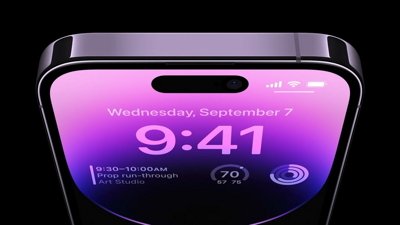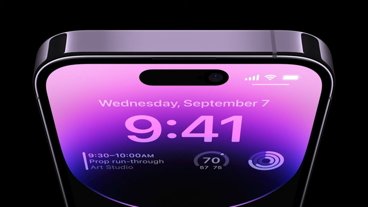Google Android flaws pushing software firms towards iPhone
Although Google is positioning its new Android platform as freeing cellphone software developers, the search engine giant's attempt to favor certain developers, technical issues, and shaky commercial appeal are reportedly driving would-be partners to iPhone.
The issue is largely known to have come to a head in mid-July, when Google unintentionally revealed that it has been favoring the winners of a developers' contest with advance releases of Android's Software Developer Kit, exposing them to newer features and bug fixes ahead of the general community. Those outside the privileged circle, both then and now, have expressed frustration that the company is in effect cherry-picking the teams it wants to succeed on launch day.
Without this equal treatment, Google is not only perceived as driving developers away but of violating the open-source mantra it took on by creating a mobile operating system, shutting out many who could contribute to the development process. Some of these have since switched or expressed a desire to switch to iPhone development in retaliation for the seeming bias on Google's part.
"The idea with open source software is to allow early adopters access to the buggier pieces of code so they can help fix them or let people who want to wait for a solid release the ability to do that," says developer Casey Borders. "The key is choice, and Google has taken away that choice and is developing Android like every other piece of closed software."
Even carriers and hardware manufacturers are believed to be encountering technical problems regardless of their access to code. Cellular provider China Mobile, which hopes to have Android devices in its home country, was recently described as having language translation problems with software, while Google's emphasis on an anticipated T-Mobile USA debut may have crowded out Sprint's attempts to get help for its own launch.
For those without the early access, the most recent software kit for Android was last released in early March, or over five months before press time.
In stark contrast is Apple, which has imposed tighter restrictions on what apps can be developed but has given third-parties frequent, equal access to updated versions of its own iPhone SDK — in some cases, seeding new releases just days apart and opening up new features at the same time.
And for some developers, the incentive to write iPhone software may simply be material: Apple, even in its relative inexperience with phones, is seen as more of a veteran in the mobile space than Google. The latter has yet to see Android on a shipping product and doesn't have the practical experience of producing devices like the iPod to develop a strong user base and sell more third-party apps.
"At the end of the day, developers want to make money," says analyst Rob Enderle, who himself was recently hired by Dell to ease its return into portable devices. "So they're going to develop on a platform and put resources on a platform that will make them money."
Recognizing this, Google has been showcasing Android builds with an integrated software store, much like Apple's App Store, which would centralize downloads and give developers more publicity than if they offered software by themselves.
Apple's insistence on control at most stages of development has kept many Android developers onboard and in some cases may goad developers to write apps for both Android and iPhone handsets, freeing them to experiment with the new platform while clinging to the one that promises them financial success. Without catering to those most eager to write for Android, however, Google is thought by at least one developer as potentially sabotaging its carefully-managed launch by alienating those outside a special group.
"Developers are the driving force behind Android applications, so without them it would be very hard for Android to have a stance in the market," says developer Mike Nowak.
 Katie Marsal
Katie Marsal













 Charles Martin
Charles Martin
 William Gallagher
William Gallagher
 Andrew Orr
Andrew Orr
 Malcolm Owen
Malcolm Owen
 Christine McKee
Christine McKee
 Chip Loder
Chip Loder









26 Comments
With access to all parts of the phone's hardware I would worry about applications messing up the phone. Apple's tighter control seems wiser.
...I can confirm first hand that Google are doing themselves no favors. I have attended several Android developer meetups and none of us have been shown a prototype to inspire us. As a software designer with 20 years experience and some ideas, this is rediculous. In particular as I can walk into any O2 or Carphone Warehouse store here in rainy England and be inspired by the iPhone - despite it's flaws.
Wasn't Apple also favoring some developers over others? Granted, Apple has no pretension of openness, but I recall some devs getting favorable treatment. I think that's all over now, but that happens, I think because of the beta state of the project.
...I can confirm first hand that Google are doing themselves no favors. I have attended several Android developer meetups and none of us have been shown a prototype to inspire us. As a software designer with 20 years experience and some ideas, this is rediculous. In particular as I can walk into any O2 or Carphone Warehouse store here in rainy England and be inspired by the iPhone - despite it's flaws.
Inspired? That looks like a cringeworthy use of the word. What is the result of the inspiration? Did you make a really nice piece of art or product? Or did it just make you happy like a drug might and not propel you into actually doing anything?
Wasn't Apple also favoring some developers over others? Granted, Apple has no pretension of openness, but I recall some devs getting favorable treatment. I think that's all over now, but that happens, I think because of the beta state of the project.
Inspired? That looks like a cringeworthy use of the word. What is the result of the inspiration? Did you make a really nice piece of art or product? Or did it just make you happy like a drug might and not propel you into actually doing anything?
Some developers still get pre-release iPhone OS builds before others. The big difference, I think, is that Apple's launch day is far behind them. So even though Apple did (and does) exactly the same thing as Google is doing, they already have millions of downloads under their belt and developers can keep making progress even without the new builds. (In fact, you can't sell apps built against the beta versions of the iPhone SDK, so most developers aren't installing it on any primary development box.)
In addition, Apple never made any pretenses to being open, transparent, and developer-friendly, so there were no expectations to violate. The fact that the iPhone SDK is a great piece of work (despite my personal dislike of XCode in general) helps them be a lot more developer-friendly than they could have been.
With access to all parts of the phone's hardware I would worry about applications messing up the phone. Apple's tighter control seems wiser.
It's worked so well for the 3G iPhone with it's release of Mobile Me, Dropped Calls possibly due to a Chip Set, iTunes 7.7.1 and Firmware 2.0 & 2.01.
My iPhone is as unstable as any Windows Mobile phone on the market and I'm tired of Apple not giving statements.
Steve's paranoia and no specs until the phone is released as well as grandstanding every event is the cause of the problems and he's doing nothing to step to the plate and address the problems that are now world wide.